Reading is one of the most important skills any one of us will ever learn. It is the foundation for learning in any and every subject. Because of this, it is important to foster a love of reading early on that makes children eager to read as they grow older. Using fun, interactive activities like those listed in this article will set the stage for children to be successful in reading for years to come!
1. Create a Shopping List
Have kids help you create a shopping list. After, read each word aloud and have them practice the reading skill of letter and sound recognition.
Learn More: Teacher Vision
2. Use Puppets
Research shows that to teach a child to read, we should give the child opportunities to retell stories as much as possible. In this activity, tell a story using a puppet, and then you can have kids retell the story using the same puppet!
Learn More: Amazon
3. Have a Preschool Pen Pal
This fun letter activity will get all kids interested in both reading and writing. They will look forward to hearing from their pen pals and reading how their lives are going before writing their own letter in response.
Learn More: Primary Playground
4. Play with Magnetic Letters
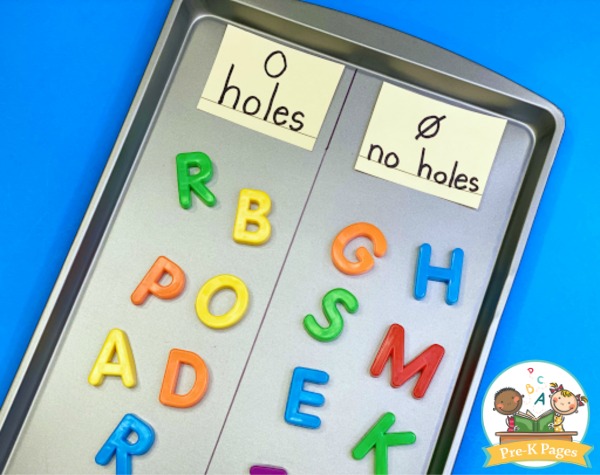
Use alphabet letter magnets to teach letter recognition. This simple activity has children put all of the letters with holes on one side and the ones without holes on the other. This helps teach them the different letter shapes. After, you can go over each letter sound.
Learn More: Pre-K Pages
5. Play Doctor
Setting up a doctor’s play area is great for use during choice time! Children can even help you create the signs for the different things included in your doctor’s play area, solidifying letter knowledge. If you have extra space, you can also make other fun play areas!
Learn More: PreKinders
6. Match Letters to Sounds
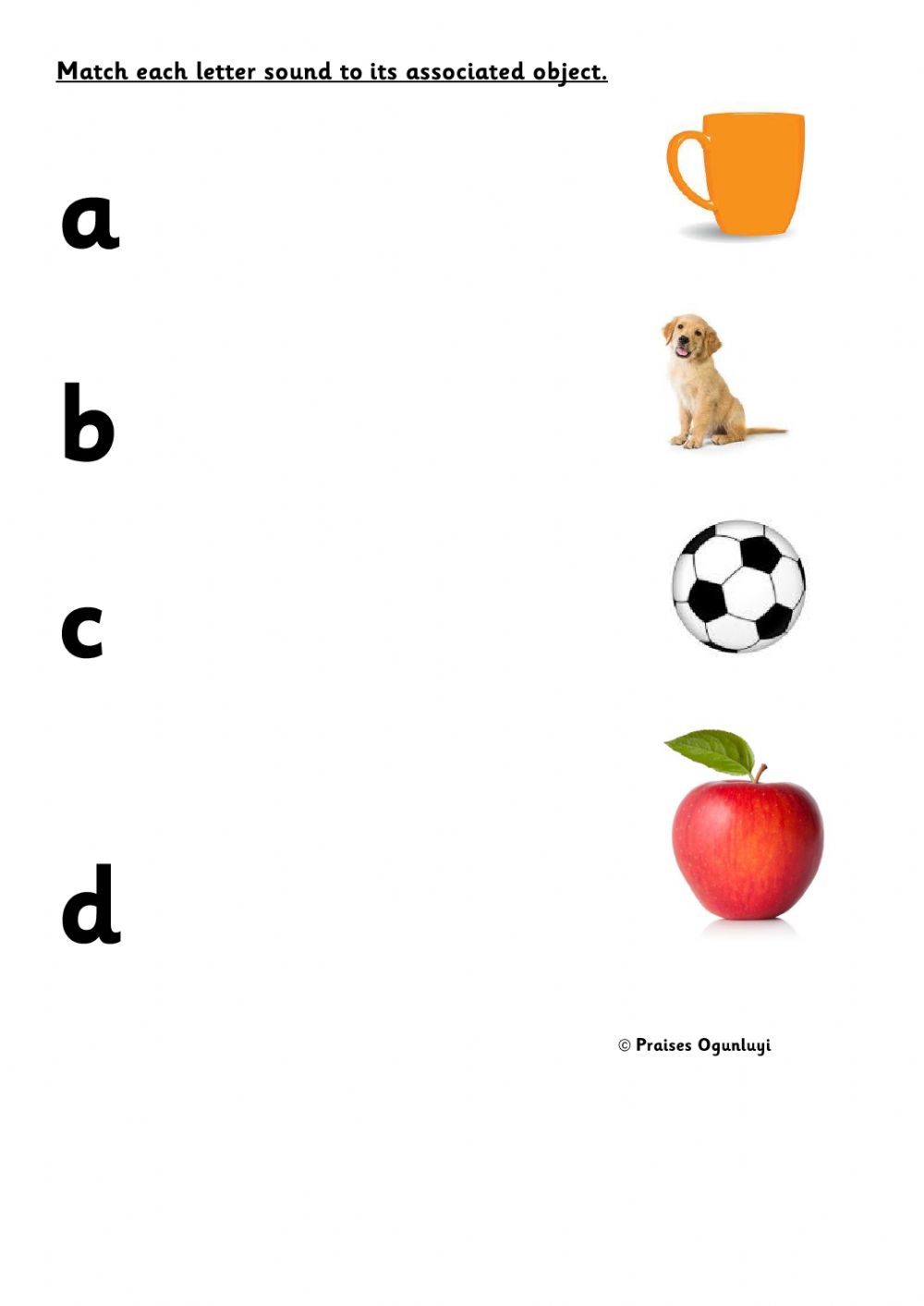
Teach letter sounds with worksheets that have children match letters to the image that begins with the correct sound. This is also a good way to teach the difference between lowercase and capital letters by using worksheets with both.
Learn More: Live Worksheets
7. Label Common Items
If you label common items around your home with their names, you can have children practicing early literacy from their baby to preschool years. They will constantly see the written words of common images, giving them a head start on letter recognition!
Learn More: 1 Plus 1 Plus 1 Equals 1
8. Play I Spy
One of the easiest activities for children that requires zero setups is I Spy! You can play by having them find items that start with a certain letter, or you can have them find the letters in words in your everyday world. Soon they will be “spying” all of the letters they see on billboards, cereal boxes…anything they come into contact with!
Learn More: Homeschool Preschool
9. Join a Preschool Book Club
If you live in a bigger area, you may be able to find a local preschool book club. If not, you can subscribe to various different book clubs for children online. Your children will be excited to see what book will show up next, which will get them excited about reading!
Learn More: Homegrown Friends
10. Do a Letter Scavenger Hunt
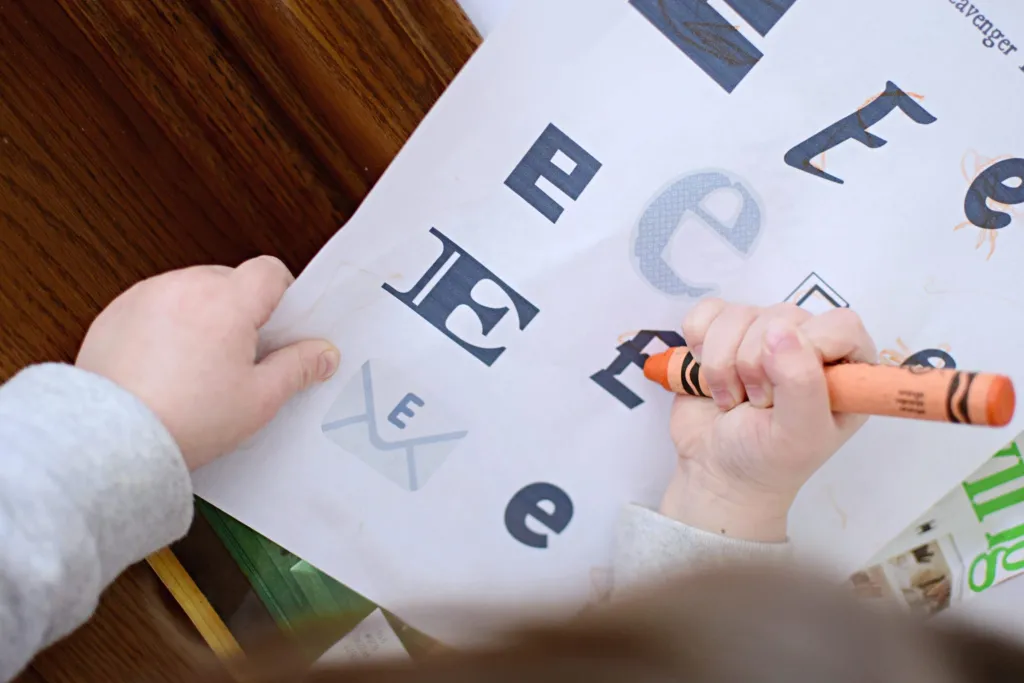
Do a scavenger hunt and find things that start with all of the letters of the alphabet in your area. You can do this in your home or on a walk. Your kids will be learning while having fun! Children can either find items beginning with the focus letters or actually find the letters in print form.
Learn More: Entertain Your Toddler
11. Play Board Games
There are a number of board games that are made specifically with literacy in mind. Play these games to practice their oral literacy. One way to play the game pictured is to create a story together, with each person adding to the story based on the picture on their game piece.
Learn More: 40 Best Board Games for Preschoolers
12. Play a Sight Word Game
The great thing about games is that children learn without even realizing it! Help your child practice those sight words now to make reading easier later. They will be excited to see what “prize” they get for every answer they get right.
Learn More: SandZ Academy
13. Read Rhyming Books
There are three stages to rhyming: hearing a rhyme, identifying a rhyme, and producing a rhyme. To introduce rhyming, read rhyming books for kids. Once they understand the concept, ask them to identify rhymes while you are reading. Finally, have them expand on the rhymes by creating their own. Soon your kids will be rhyming masters!
Learn More: Early Learning Ideas
14. Watch Nursery Rhyme Videos
Who doesn’t remember nursery rhymes from their childhood? Nowadays, kids can access cartoons and videos with nursery rhymes easily using YouTube. Soon they will be dancing around singing these catchy tunes in their everyday lives. They will be practicing early literacy skills without even realizing it!
Learn More: Farmees – Nursery Rhymes And Kids Songs
15. Start a Home or Classroom Library
Fill up a child-sized reading corner with their favorite books, award-winning books, alphabet books…any and all books you can get your hands on that will pique their interest in reading! Have them pick a few books to read each night before bed and foster a love of reading early on.
Learn More: National Association for the Education of Young Children
16. Read Wordless Picture Books
Read a picture book without any words. This allows your children to use their imaginations to make up their own storyline as they read. You can read the same book multiple times and come up with a different story every time!
Learn More: 30 Classic Picture Books for Preschool
17. Play A Fun Phonics Game
Learning phonics is an important language skill to better understand letter sounds and the relationship letters have to one another. By playing phonics games, your kids will have so much fun, that they will forget they are learning.
Learn More: 25 Fantastic Phonics Activities for Kids
18. Act Out Stories
After children read and know stories well, have them act them out. This will build on the literacy skills of recall and comprehension at the same time. And you will get to see their creativity as they act out their favorite stories!
Learn More: High Scope US
19. Make Real-World Connections
As you read to your children, make real-world connections by asking leading questions like “how would you feel if this happened to you?” or “have you ever been to a park like this?” This helps them make an association between books and the real world.
Learn More: Teach Stone
20. Tell Family Stories

Telling stories about your family to your child helps them feel connected to something bigger and also find their place in the world. When they are ready, they can tell their own stories of fun things you have done together to practice their recall skills!
Learn More: Leadership Storylab
21. Have Them Repeat Directions
Having your child repeat back directions you have given him or her does two things: 1. It makes sure they know what is understood of them, and 2. It helps build and practice their oral vocabulary and recall skills. And this way they can’t claim they didn’t hear you when you asked them to do something!
Learn More: Child Mind
22. Create a Storybook
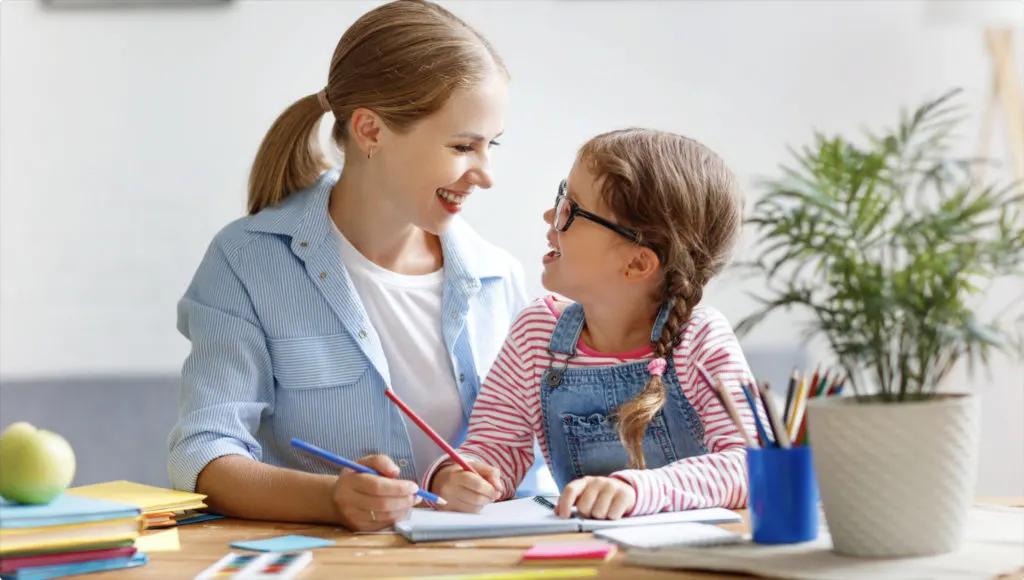
Have your child dictate a story as you write it on the pages of a blank book, and then have them add illustrations to practice their fine motor skills. They will practice many literacy skills at once and be excited to add their book to the bookshelf.
Learn More: Kinder Art
23. Practice Sight Words with Magnetic Letters
Using a whiteboard and magnetic alphabet numbers, have children match the magnets to words you have written out. As they get older, you can add additional vocabulary words to this fun game. You can also messages written in magnetic letters on your fridge to further encourage literacy development.
Learn More: Fun Learning for Kids
24. Create a Menu
Involve your child in your weekly meal planning by having them create their own menu. You can give them a list of options and they can copy down which they would like that week. They will be practicing their reading and writing skills while feeling involved with family planning!
Learn More: Primary Treasure Chest
25. Make Bath Time Fun Time
Use foam letters on your shower wall to turn bath time into learning time. They will have fun manipulating the letters to create new words! This is an easy, no cleanup activity that they can play every time they are getting clean.
Learn More: Munchkin
26. Create Alphabet Letter Shapes
Use alphabet cookie cutters and playdough for a fun hands-on activity for preschoolers. After they have created enough letters, have them put them together to make words. You can also do this game with cookie dough and make edible letters!
Learn More: Doughnique
27. Make Alphabet Jewelry
Using string or pipe cleaners and alphabet beads, have children create jewelry. You can link this to books you have recently read and have them spell out words related to the story.
Learn More: Preschool Inspirations
28. Create the Alphabet with Blocks
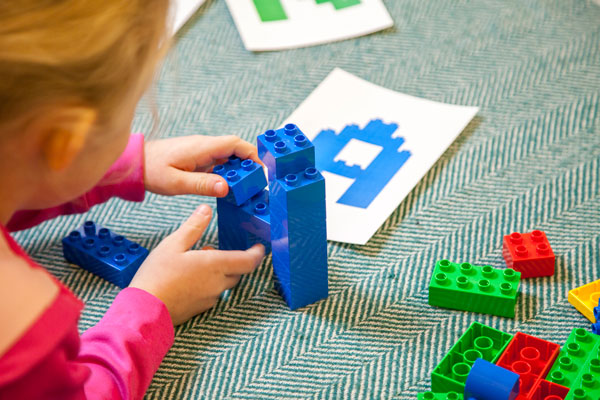
Using printouts of letters and building blocks, have children literally build the letters of the alphabet. Soon they will be alphabet masters and ready to take on reading on their own!
Learn More: All About Learning Press
29. Write with Marshmallows
This activity is great for letter recognition and for teaching children to spell their names. After writing their names on paper, give them some glue and marshmallows and have them create their own marshmallow art. And hey, when they are done, they can even eat a few marshmallows!
Learn More: HiMama Child Care App
30. Create a Rhyming Anchor Chart
Anchor charts are great reminders for all kids and help visual learners really cement new concepts. Create a rhyming anchor chart to solidify the concept of rhyming using words and pictures. After, read books with rhymes and ask the children to point out when you rhyme two words.
Learn More: Teachers Pay Teachers